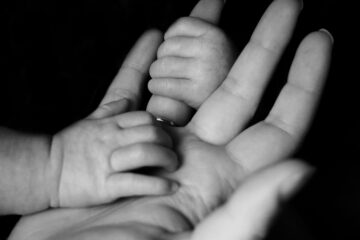by Rebecca Baumgartner

The transformation of bringing a child into one’s family is conceptualized differently by different folks. It is rare, however, to encounter a parent who questions whether parenthood is any kind of transformation at all. This is the provocative stance taken by Anastasia Berg in her piece “What If Motherhood Isn’t Transformative at All?”
Berg is a philosophy professor at UC Irvine. She is also a mother who is very invested in not being changed by the experience of motherhood – or at least, in having us think that she is very invested in not being changed by the experience of motherhood.
The article purports to be about “the pitfalls of treating motherhood as a transformative identity,” but it’s not actually about those pitfalls at all. What it’s actually about is Berg’s reluctance to be a certain type of mother, and her insecurity about whether this necessarily makes her a bad mother. She doesn’t say this explicitly, mind you; this is a piece that presents the facade of vulnerability, while building an elaborate bastion against vulnerability with every sentence. Despite coming from an ostensibly feminist starting point, Berg puts forth a viewpoint that I find just as disingenuous, confining, and unsatisfying as the blanket dictum that parenthood should consume one’s life.
Berg’s insecurity shows up as a series of seemingly nonchalant statements such as:
“A friend warned I would not be able to think for months after the birth; but I replied to work emails from the hospital bed. They didn’t make less sense; they didn’t seem any less important. The only thing standing in my way was the restricted use of my arms.”
She continues sarcastically, responding to a culture that expects new moms to care about nothing but their child:
“Strange — all the same things continued to matter to me: the same philosophical questions, the same friends and their same problems, the same politics, the same petty gossip.”
This is what I believe is known in philosophy as “a strawman followed by an insufferable humblebrag.” No one really believes you can’t think “for months” after the birth of a child, and if her friend did say that, she was surely exaggerating. And no one said philosophical questions would stop mattering after giving birth, either. If anything, becoming a parent is likely to increase the relevance and urgency of such questions. Likewise, answering work emails from a hospital bed is one of those scenarios that is so classically bad that it’s used in TV shows as shorthand for someone having questionable priorities.
I’m not certain what to do with this semi-proud confession about answering work emails less than 48 hours after giving birth, nor do I know how to take her referring to her brand-new daughter as being “in [the] way,” or the smug aside about how she offered to walk after giving birth but was forced to sit in a wheelchair (she rushes to assure us this was hospital policy; not for her such an admission of feebleness). We are meant to read these as examples of how un-transformed Berg was by becoming a parent. But to me it rather seems to be the portrait of someone unhealthily fixated on work, uncomfortable in their own skin, and stubbornly unable to be present in their own life.
How are we to interpret whatever argument is being made here? If answering work emails from a hospital bed is an example of what it means to avoid “the pitfalls of treating motherhood as a transformative identity,” then I wonder in turn what the pitfalls of not treating motherhood as a transformative identity are. Because responding to work emails shortly after giving birth doesn’t feel like a liberation from an oppressive identity to me; it seems like simply being subsumed by a different identity.
In some ways, I sympathize with what Berg is trying to do, even if I find her reasoning insincere. She wants to be seen as the opposite of the frazzled, emotional mother, the hormonal woman who falls in love with her baby and whose world is instantly and permanently narrowed to Baby’s Needs. Like every mother I’ve ever met, including myself, she doesn’t want to be the kind of mom who lets her friendships drift away, who abandons her hobbies, who gives up her ambition, who no longer has serious opinions. This stereotype of self-abnegating motherhood flattens the richness of human life and erases everything else interesting about a woman that isn’t her role as a mother. This much is easy to agree with.

But in her effort to distance herself from this stereotype, Berg overstates her case and we are left with the same worn-out binary that women are sick to death of hearing about: You can either be the emotional mother who over-identifies with her child and loses her sense of self, or the career- and/or self-obsessed mother who fails to build a new way of relating at all. There are apparently no other ways to emerge from this experience. In Berg’s view, you’re either swallowed whole by it, going for months without thinking, or you reject the premise of transformation altogether, plugging your ears and saying “La la la, I can’t hear my changing sense of self over the sound of these work emails!”
To maintain this artificial dichotomy, Berg argues herself into some pretty absurd corners. Take, for example, her attempt to understand, at the most fundamental level, what it is her daughter wants from her, like a Vulcan attempting to understand these human things called “relationships”:
“I wanted to offer my daughter the benefits of having a loving mother stably present in her life, there with her, attentively, day in and day out, deadlines permitting. But often it seemed like it really didn’t have to be me at all. Nothing about me — my ideas, my personality, my judgment, my sense of humor — really mattered. She wants her mother to sit next to her while she’s on the potty, or in the bath, or in bed, or in the car, but I’m at best just okay at sitting. She wants her mother to follow her on the playground, but I have no unique talent for the seesaw or pushing a child on a swing.”

What is painfully missing from this account of what it’s like to take a small child to the playground is a recognition of the child’s emotional life – and child development and relationship-building more generally. No child wants their parent to push them on the swings because the parent is amazing at being a swing-pusher. It’s not a matter of “unique talent” – or if it is, the unique talent is “being mom.”
Berg is framing childrearing as a transactional meritocracy, as though all adults are interchangeable anonymities in a child’s life and whoever is best at each bonding activity should be the one to handle it. But this is to give short shrift to a parent’s irreplaceability. It does have to be her – which is not to say that it always has to be her (child care is a wonderful thing), but when it is her, it is her subjectivity and unique personhood that her daughter wants, not just one of her composite parts.
Berg laments that during her daughter’s early years, she (Berg) “wasn’t giving expression to any talent or ability whatsoever,” and adds that “I wasn’t growing, I wasn’t learning. So often I was barely doing anything at all.” This can only make sense if we agree to her extremely narrow use of the terms “talent,” “ability,” “growing,” and “learning” to mean engaging in paid, achievement-oriented tasks.
The claim that she was “barely doing anything at all” during her daughter’s infancy does not conjure images of a woman who has avoided the pitfalls of identifying herself as a mother; it reads to me like a person so uncomfortable with intimacy of all kinds that they can’t comprehend that forming relationships indeed counts as doing something. In fact, let’s reflect on how deeply strange it is for a philosopher, of all people, to declare that interacting with another mind is not really “doing anything.” And how strange it is for an educator, of all people, to claim that initiating a child into the wonders of the world does not require talent or ability. There is a literal-mindedness – indeed, almost a bloodymindedness – here that is difficult to reconcile with a person who wants to make a good-faith argument.
When Berg quotes another writer saying that parenthood unlocks a new kind of liberty to replace earlier kinds of freedom, she takes this very literally. “This is not what I think of when I think of freedom,” she says, in reference to having “nothing to do but stand there and absorb a baby’s vociferous expressions of displeasure.” (I suppose comforting and connecting with the upset baby didn’t count as “doing anything.”) The freedoms of parenthood are mostly metaphorical – a loosening of the ties of ego, for example, or freedom from the hold that your own childhood might still have over you.
If Berg is conceiving of freedom as solely, and literally, freedom to go to the movies whenever she wants, then she’s missing the point. She laments that she’s gone to the movies (or the “cinema” as she calls it, presumably to justify why she likes it despite being a Serious Person) only twice since her three-year-old daughter was born. This seems to contradict the rest of her argument. Here she is saying that her life has changed since having a child, but at the same time she’s questioning the “assumption” that motherhood is transformative. Which is it?

The way she gets around this is by describing her overall state as “not so much transformed as reduced to very basic functions.” In other words, functions that don’t require or depend upon her “ideas,” “personality,” “judgment,” or “sense of humor.” I, for one, don’t see how it’s possible to raise a child without ideas, personality, judgment, or a sense of humor. The alternative is so bleak that it doesn’t bear contemplating.
And who asked her to raise her child without using her ideas or personality, anyway? This is a restrictive and unimaginative conception of what parenthood can be, and she has done it to herself. All of her descriptions of parenting come down to standing there – pushing swings, holding a screaming baby, sitting, following, absorbing her daughter’s bad moods. To be sure, there are days of parenthood that feel like this, but it would be perverse to build an entire philosophy of parenting from such a foundation.
There’s also a touch of snobbishness to this language of “basic functions” versus “ideas.” It’s has echoes of blue-collar versus white-collar jobs, manual labor versus knowledge work. The implication is that these basic functions of parenthood are beneath her; she is overqualified for motherhood. At bottom, it seems like it’s an identity she is reluctant to claim because it feels like a demotion from her role as a philosophy professor. “I have spent my entire life tracking excellence like a hound dog,” she says at one point. “Most of my time spent with her in those early years, I wasn’t giving expression to any talent or ability whatsoever.” The implication is that child-rearing doesn’t fit into this hunt for excellence, and that it doesn’t require any talent or ability. (I’d like to point out that this is exactly the mindset of the stereotypical 1950s dad who came home from work and demanded to know what his wife had done all day while home with the kids. Because care work isn’t really work, right?)
There is no question that parenting requires a different set of skills from office work, or academic work, or any other type of paid work. In my personal experience, parenting has almost no need for the skills I learned in college or on the job. Instead, parenthood requires me to amp up my creativity and improvisational abilities by about a thousandfold, and has demanded I get better at pacing myself, practicing empathy, and leaving my comfort zone – skills that are far from “basic” in terms of how difficult they are to master.

These skills may not be academic, but they certainly are not devoid of judgment or personality or a sense of humor. If anything, I have found that I bring my whole self to parenting in a way that I never could (or wanted to) with a job, even if that job was deeply fulfilling. Each person’s transformation will look different, and some will be better than others at integrating their new role as a parent into their existing self-image, but to claim that such a transformation is optional seems delusional.
Indeed, Berg’s claims are so bizarre and I am so reluctant to attribute them to a person who seems well-intentioned that I am calling her bluff. I think this is posturing. She means to present herself as too sophisticated for something as “basic” as taking care of another human being. We get the impression that she believes it’s below her pay grade to be pushing people on swings, but she gave birth to a creature who wants to be pushed on a swing. She is a dutiful person, so she obliges. However, she’ll be damned if she’s going to let herself become the kind of person who makes a habit of it – that is, a person who has transformed.
Berg tells us that “resisting transformation comes at a cost” (with the implication that not everyone can manage it). But why should transformation categorically be resisted? And isn’t this resistance, which she frames in terms of “survival,” “perseverance,” and “dogged efforts to hold [herself] together,” pretty damn similar to the maternal martyrdom that she wants us to reject? The subtext is, “Oh don’t mind me, I’m just over here trying to hold my sense of self intact against the cultural pressures of motherhood,” while pointedly looking over to see if anyone is listening and coming to pat her on the back. This is performative ambivalence as a gambit for pity or camaraderie.
Resisting transformation does indeed come at a cost, but what is she getting in exchange for that cost? Intellectual cachet, certainly; humble-bragging opportunities with friends, probably; a way of coping with anxiety, too, no doubt. But I’m not sure any of that is a fair trade. For one thing, it means she has to uphold an artificial binary of motherhood, devalue care work, and view the parent-child relationship as an anonymous transaction in which uniqueness and personality don’t matter.
None of this is meant to deny that there is in fact only so much baby-screaming and swing-pushing one person can tolerate before they need to replenish their mental reserves, or that mothers need more support from our society, or that parenting can be lonely and at times grueling. But it’s undeniable that learning how you want to deal with the screaming baby or the toddler demanding you chase them for the hundredth time – even if your way of dealing with it is to stand there feeling incompetent and angry, sometimes – represents a new mindset, a new facet of one’s identity. To claim otherwise is, perversely (and one would assume, contrary to Berg’s politics), to minimize the importance of caretaking work as “real” work that is complex and demanding of skill in its own right.

Allowing your sense of self to remain receptive to outside influences, keeping your identity flexible and somewhat porous, is not a sign of weakness or lack of self-knowledge or ambition. On the contrary, it’s the people who are most sure of their ability to achieve stability no matter what life throws at them who are the most willing to experiment and evolve. They know their core self won’t crumble if they incorporate new roles and new identities into their subjectivity. Resistance to transformation (or denial that transformation has occurred) is likewise not a sign of strength; it is a sign of rigidity stemming from insecurity. If you’re not certain of who you are or of your ability to manage change, any upheaval can feel like a threat. It might, in fact, just be easier to deny that an upheaval has taken place at all.
I am not one to shame others for not feeling grateful; I don’t think true gratitude is something one can be shamed into anyway. And yet, part of me is very tempted to charge parents like Berg with looking a gift horse in the mouth. I would tell them: Accept the gift. Transformation – plunging headfirst beyond what you’d always thought your limits were – is a gift, even if, like many gifts, it’s not an unqualified good. You just need the courage to accept it.
